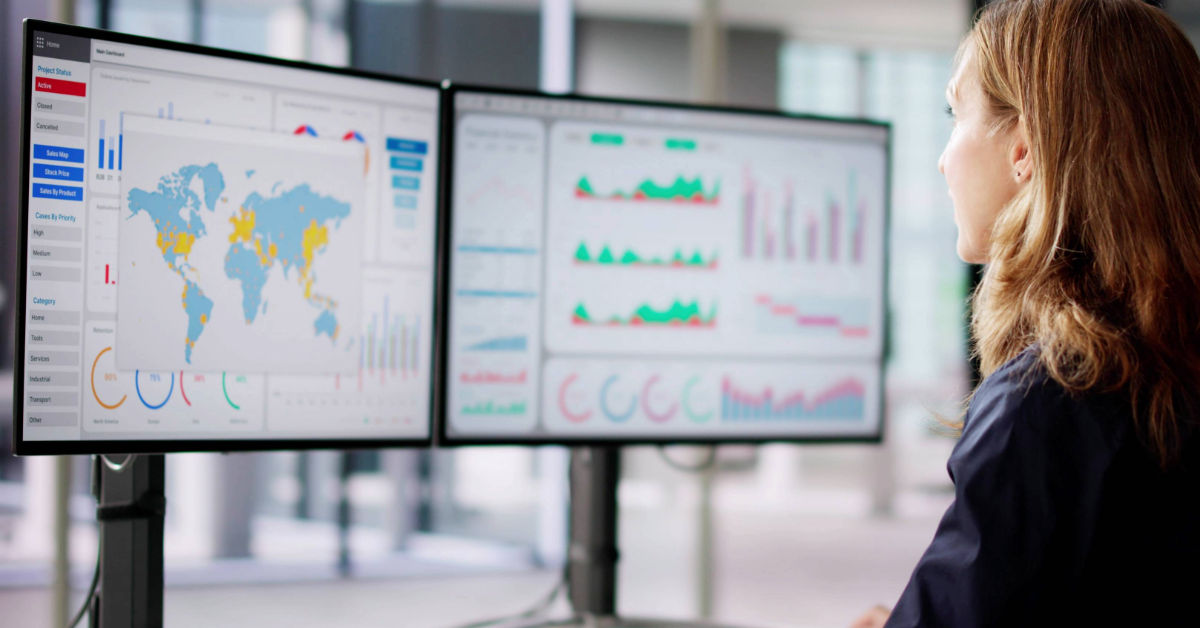Marketing continues to evolve at pace, and the latest data from UK businesses gives us a clear picture of what’s coming next. From AI to video to in-person events, the trends for 2026 reveal a shift toward smarter tools, more diverse content formats, and a renewed focus on organic visibility.
Using responses from our latest UK State of Digital Marketing Survey, here are our data-driven predictions for the biggest marketing trends in 2026.
1. AI-driven marketing will continue to grow at pace
Artificial intelligence is no longer experimental; it’s becoming a core part of how marketers work. In 2026, marketers will rely more heavily on AI for drafting content, analysing performance, automating workflows, and improving response times. And with more businesses targeting visibility within AI-powered search tools, SEO strategies will shift toward structured, authoritative, and high-quality content that AI systems can reference.
AI-driven marketing trends we saw in our 2026 UK State of Digital Marketing Report:
- 45% of businesses say they will use more AI for content creation.
- 37% will increase their use of AI for marketing automation.
- 26% plan to grow their use of AI for customer service.
- 38% plan to include AI in their marketing strategy.
- 32% will focus more on appearing in AI-generated search results.
2. Video (especially short form) will continue to dominate
On average, UK audiences are spending 28% of their day on their phones; that’s a lot of scrolling and a lot of content being consumed.
Short-form video will remain the most effective way to capture attention quickly, especially across social platforms where audiences expect fast, digestible content.
This means that video content is no longer a ‘nice to have’, it’s now essential for businesses that want to cut through the noise, stay visible and communicate in an engaging way.
Long-form video will also continue to play a vital role in marketing, as platforms prioritise richer, more useful content. On YouTube, chapter markers and timestamps help viewers find what they need quickly, improving watch time and signalling quality and relevance. Longer videos also give brands the space to showcase expertise and answer the detailed questions people now bring to search.
Long-form content also gives businesses more chance of appearing in AI-generated search results. Google’s AI Mode and AI Overviews often reference authoritative, well-structured content. Long-form videos supported by strong metadata, transcripts and clear chaptering give AI systems better context to pull from.
Video marketing trends we saw in our 2026 UK State of Digital Marketing Report:
- 46% of businesses will increase short-form video (the strongest growth of any format).
- 32% will grow long-form video.
- 60% plan to increase video marketing overall.
3. SEO and social media will increasingly support each other’s impact
While SEO and social remain distinct channels with different algorithms and goals, they now influence each other more than ever. Strong social content can indirectly boost SEO by increasing brand searches, driving traffic, generating backlinks, and signalling credibility; factors that help search engines build a clearer picture of a brand’s authority.
At the same time, search engines are now returning more social content in their results, especially from platforms like YouTube, Reddit and LinkedIn, which means socially active brands gain more touchpoints across the search journey.
As AI’s influence in search and brand discovery grows, businesses that align their SEO and social strategies will create a more cohesive presence across both search-driven and social-driven discovery.
SEO and organic social trends from our 2026 UK State of Digital Marketing Report:
- 67% of businesses plan to grow SEO.
- 69% plan to grow organic social media.
- 33% plan to expand their multi/omni-channel marketing.
4. Paid advertising continues to grow, but expect big shifts in paid search advertising
Search advertising and social advertising will remain essential channels for UK businesses going into 2026.
Almost half of UK businesses running paid search campaigns said they’ll increase their spend on Google Ads in the year ahead. The introduction of AI Mode/AI Overviews has meant fewer traditional blue-link opportunities and less SERP visibility due to AI-generated summaries.
Running ads for high-intent keywords has now become a vital way of capturing high-intent customers at the moment they are ready to act. As a result of this increased importance, search advertising has become an even more competitive environment as businesses look to reclaim visibility on the SERPs.
UK businesses should expect search advertising to remain challenging in the year ahead, with big shifts and new features on the horizon.
At the time of writing this blog, AI Max for Search is in beta-testing for UK businesses. This is a new, optional feature suite within existing Google Ads Search campaigns that leverages advanced AI to automate and optimize ad targeting, creative generation, and landing page selection. It is designed to expand campaign reach and improve performance with less manual effort, while still offering more control and transparency than the fully automated Performance Max campaigns
Paid social will continue to play a vital role in helping businesses maintain brand awareness, whilst also reaching a new audience beyond their existing following. This type of targeting is perfect for reaching potential customers who may not be 100% ready to commit to a transaction, but have been exploring similar services.
Together, these channels work together and provide a reliable, scalable way to help potential customers through the buyers journey, and in turn, drive conversions.
Paid advertising trends from our 2026 UK State of Digital Marketing Report:
- 41% of businesses plan to grow their PPC activity.
- 48% plan to increase Google Ads spend.
- 41% plan to increase paid social advertising.
- 40% plan to increase Facebook spend.
- 31% plan to increase LinkedIn spend.
5. Content marketing becomes more interactive and multi-format
2026 will see businesses adopt far more diverse and dynamic content strategies. Interactive formats such as polls, quizzes, calculators, and live Q&A sessions will become core engagement tools, helping brands collect real audience insight while boosting participation. Webinars, workshops, and community-style events will continue to rise as customers look for more value-driven experiences rather than passive content.
User-generated content, customer stories, and creator-led assets will also grow in importance, giving brands greater authenticity and social proof. At the same time, AI-driven production tools will make it easier to repurpose a single idea into multiple formats, from short-form social clips to long-form articles, infographics, and video explainers. This shift toward multi-format creation will help brands stay visible across more channels, reach wider audiences, and create stronger touch points throughout the customer journey.
Content marketing trends from our 2026 UK State of Digital Marketing Report:
- 61% plan to grow content marketing
- 43% want to start using interactive content
- 37% want to start using user-generated content
- 27% will expand webinars
6. In-person events return as a key engagement channel
People are becoming increasingly fatigued by the constant stream of advertising, and bigger brands are already realising they have to provide something a bit more creative if they want to create a positive brand experience and retain brand loyalty.
Workshops, conferences, networking events, special in-store events and customer meet-ups will play a larger role in building trust and driving leads, with 47% of UK businesses saying they will do more in-person events in 2026.
7. Customer service shifts to social and AI-powered channels
In 2026 we’ll see customer service continue to move into social channels as consumers continue to favour platforms like Instagram, Facebook, TikTok and X (formerly Twitter) for quick, informal communication. Instead of relying on email or phone support alone, businesses will start engaging customers directly within these platforms where conversations already happen in real time.
AI tools will accelerate this shift by helping companies automate initial replies, route enquiries to the correct team, and dramatically reduce response times. Smart chatbots will be able to answer routine questions instantly, pass more complex issues to human agents, and maintain context throughout the exchange. This allows customers to access support around the clock while service teams spend less time on repetitive tasks.
As adoption grows, organisations that invest early in social-first support systems supported by AI-driven triage, sentiment analysis and automated workflows will be able to deliver faster and more personalised service at scale.
Customer service trends from our 2026 UK State of Digital Marketing Report:
- 34% plan to increase customer service through social DMs.
- 26% want to start using AI for customer service.
- 20% want to start using virtual communities.
8. Marketing teams will look to grow their in-house skills and experiment with tools and automation.
Businesses will continue shifting toward in-house skills, supported by automation and AI tools that help teams work faster. Training in video production, SEO, content strategy, and AI tools will become essential.
Marketing skills and technology trends from our 2026 UK State of Digital Marketing Report:
- 56% feel overwhelmed by the pace of change.
- 54% say tracking performance is improving.
- 30% will expand their in-house team.
- 30% will invest more in marketing tools and technology.
- 38% plan to use more creative automation.
2026 UK marketing trends summary
Marketing in 2026 will be shaped by smarter use of AI, growing investment in paid search and paid social, increased demand for short-form and long-form video, and a shift toward more interactive, multi-format content.
UK businesses will also have to prioritise a more cohesive multi-channel strategy to keep up with changing customer behaviour and AI-powered search environments.
If you’re looking to scale your marketing output, refine your strategy or need some help navigating the changes within search marketing, then contact us to see how we can support your business’s growth.
Want to access more marketing statistics and insights from UK Businesses? Download our free 2026 UK State of Digital Marketing Report.






